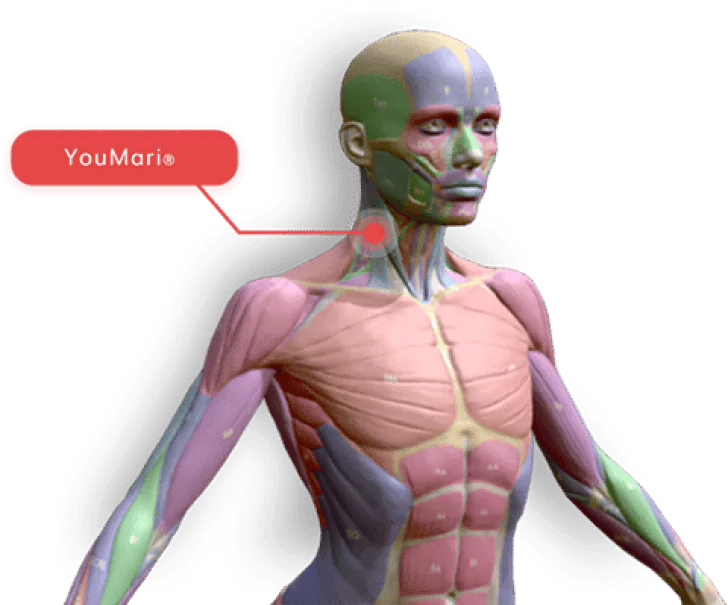Discover personalized, non-invasive therapies that target hormone imbalances, restore equilibrium, and promote overall wellness—delivered in our clinics, at home, or onsite at your workplace.
Hormone imbalances occur when the body produces too much or too little of certain hormones, disrupting essential bodily functions. These chemical messengers regulate everything from metabolism and energy levels to mood, sleep, and reproductive health.
Hormone imbalances can occur in both men and women and may result from aging, stress, lifestyle factors, or underlying medical conditions. Left untreated, imbalances can lead to fatigue, weight gain, mood changes, and chronic health issues.


We go beyond managing symptoms to uncover the root causes of hormone imbalances. Using advanced diagnostics and personalized treatment plans, we optimize your neuroendocrine system to restore balance and support long-term health.
Our approach integrates precision medicine with regenerative therapies, focusing on reducing inflammation, addressing deficiencies, and improving organ and gland function for sustainable results.

Experience hands-on care and advanced regenerative therapies in a relaxing, state-of-the-art environment.
Continue your healing journey with easy-to-use devices designed for at-home therapy.
Bring regenerative medicine to your workplace, improving employee health and productivity.
Our Regenerative Therapies our Not the Alternative, they are the
BEST CHOICE
We are committed to personalizing treatment plans based on what is best for every individual’s UNIQUE circumstances to include symptoms, budget, lifestyle, and goals. Conservative (non-pharmaceutical) care is often effective in resolving hormone imbalances.

We will review your health history, symptoms, and current treatments to help determine the severity of your condition. We may recommend additional testing and analysis to get a full picture of potential therapies personalized to you.
If your condition qualifies for conservative care options, we will present a treatment plan that includes only those therapies proven to be effective in treating your condition. This may include comprehensive lab testing and AI analysis to find the root causes of your imbalance. Additional options include DNA nutrigenomics analysis for lifestyle design, food sensitivities, and other therapies to resolve issues limiting mobility. You will be provided with treatment plan options and timelines with transparent out of pocket costs to you.

Hormone imbalances can significantly impact overall health and well-being. Integrative and regenerative therapies offer diverse approaches to managing these imbalances.
Nutrigenomics explores how individual genetic variations affect nutrient metabolism and utilization, helping tailor nutritional interventions to address hormone imbalances.
By identifying genetic variations, nutrigenomics allows for personalized dietary recommendations that support hormonal health and balance.
Pharmacogenomics studies how genetic variations affect individual responses to medications, allowing for more targeted and effective hormone treatments.
It helps customize hormone replacement therapies and other medications based on genetic profiles to enhance efficacy and minimize side effects.
Sleep Studies focus on diagnosing and improving sleep disorders, which are closely linked to hormonal health and can affect hormone balance.
Addressing sleep disorders can help regulate hormones, improve metabolic processes, and enhance overall hormonal balance.
Inflammation Programs focus on reducing chronic inflammation through diet, lifestyle changes, and supplements, which can impact hormonal health.
By reducing systemic inflammation, these programs can help improve hormonal balance and overall health.
Neuroinflammation Therapy addresses inflammation in the brain, which can affect hormonal balance and overall health.
Neuroinflammation therapy targets inflammation in the central nervous system, which can influence hormone production and regulation.
Red Light Therapy (Low-Level Laser Therapy, LLLT) uses specific wavelengths of light to enhance cellular function and reduce inflammation, which may benefit hormonal health.
Red light therapy may improve cellular health and reduce inflammation, potentially supporting hormonal balance and overall health.
Bioidentical Hormone Therapy involves using hormones identical to those naturally produced by the body to address imbalances.
Bioidentical hormones can effectively address imbalances by mimicking the body’s natural hormones, improving symptoms and overall health.
Environmental Toxins Tests assess exposure to environmental toxins that can disrupt hormonal balance.
Identifying and reducing exposure to environmental toxins can help restore hormonal balance and improve overall health.
Shockwave Therapy (Extracorporeal Shock Wave Therapy) is used primarily for musculoskeletal conditions but may also influence inflammation and overall health.
While not typically used for hormonal issues, shockwave therapy may support general health by reducing inflammation and improving tissue repair, which can indirectly benefit hormonal balance.
Integrative and regenerative therapies offer a comprehensive approach to managing hormone imbalances:
These therapies can be integrated into a holistic treatment plan to address various aspects of hormonal imbalances, enhancing overall well-being.
Symptoms can include mood swings, weight gain, fatigue, irregular periods, hot flashes, sleep disturbances, and changes in libido.
Causes can include stress, poor diet, lack of exercise, aging, thyroid disorders, adrenal issues, reproductive health problems, and certain medications.
Diagnosis typically involves blood tests to measure hormone levels, saliva tests, and sometimes imaging studies to assess gland function.
Bioidentical hormones are chemically identical to the hormones naturally produced by the body. They can help restore hormonal balance in conditions like menopause or low testosterone.
Hormone therapy may be recommended if symptoms are severe and unresponsive to lifestyle changes or if specific hormonal deficiencies are identified through testing.
Frequency varies based on individual needs and treatment plans. Regular monitoring is essential to assess the effectiveness of treatment and make adjustments as needed.
While not all imbalances are preventable, maintaining a healthy lifestyle, managing stress, and regular medical check-ups can help reduce the risk of developing hormone-related issues.
Nutrigenomics explores how genetic variations affect nutrient metabolism and overall health. It helps create personalized dietary plans to improve hormonal balance.
By tailoring dietary recommendations to an individual’s genetic makeup, nutrigenomics can help optimize nutrient intake, which may improve hormone balance and overall health.
Pharmacogenomics analyzes how genetic differences affect an individual’s response to medications, allowing for personalized hormone therapy.
It helps in selecting and adjusting medications based on genetic profiles, which can enhance effectiveness and minimize adverse effects.
Sleep Studies identify and address sleep disorders, which can significantly affect hormonal health.
Yes, addressing sleep issues can restore hormonal balance, as poor sleep is linked to disrupted hormone production and regulation.
Inflammation Programs focus on reducing chronic inflammation through diet, supplements, and lifestyle changes, which can impact hormonal health.
Chronic inflammation can interfere with hormone production and function. Reducing inflammation may help restore hormonal balance and improve overall health.
Neuroinflammation Therapy targets inflammation in the brain, which can influence hormonal regulation and overall health.
By reducing brain inflammation, neuroinflammation therapy can help normalize hormone levels and support overall endocrine function.
Red Light Therapy (Low-Level Laser Therapy, LLLT) uses specific wavelengths of light to reduce inflammation and enhance cellular health, which may influence hormonal balance.
Red light therapy may support hormonal health by improving cellular function and reducing inflammation, potentially benefiting endocrine function.
Bioidentical Hormone Therapy uses hormones that are chemically identical to those naturally produced by the body to correct hormonal imbalances.
Bioidentical hormones can restore hormonal balance more effectively and with fewer side effects compared to synthetic hormones.
Environmental Toxins Tests assess exposure to chemicals and pollutants that may disrupt endocrine function.
Yes, testing for and reducing exposure to harmful chemicals can help restore hormonal balance and improve overall health.
Shockwave Therapy (Extracorporeal Shock Wave Therapy) is primarily used for musculoskeletal conditions but may influence inflammation and overall health.
While not directly targeted at hormonal issues, shockwave therapy may improve general health and reduce inflammation, which could indirectly support hormonal balance.
Integrating these therapies can create a comprehensive approach to treating hormone imbalances and improving overall well-being.
Common symptoms include fatigue, mood swings, weight gain, hair loss, irregular periods, low libido, sleep disturbances, and difficulty managing stress.
PBM supports mitochondrial function, reducing inflammation and enhancing glandular activity. This helps regulate hormones like cortisol, thyroid hormones, and reproductive hormones.
Hydrogen inhalation therapy provides systemic antioxidant benefits, reducing oxidative stress and inflammation that disrupt hormone production and balance.
Targeted nutrients support the production and regulation of key hormones, addressing deficiencies that contribute to imbalances.
Genetic testing helps identify predispositions affecting hormone production, metabolism, and function, allowing for highly personalized treatment strategies.
Pharmacogenetics identifies which medications or therapies are most effective for your genetic profile, ensuring optimal outcomes for hormone-related conditions.
The MIT AI technology provides an in-depth analysis of hormonal imbalances, systemic inflammation, and other contributing factors, allowing for precise and targeted treatment plans.
Food sensitivity testing identifies dietary triggers that may contribute to inflammation and hormonal disruption, helping to create a personalized diet plan that supports balance.
Yes, all our therapies are non-invasive, safe, and designed for long-term use without harmful side effects, making them ideal for managing hormone imbalances.
In many cases, our therapies can optimize hormone production and balance naturally, reducing or eliminating the need for hormone replacement therapies.
Our therapies are ideal for individuals experiencing:
Book a consultation with our team to assess your symptoms, discuss your goals, and create a personalized treatment plan for achieving hormonal balance and improved well-being.
See Plans & Pricing

Connect with us over our social platforms & find special deals for you!
© Copyright 2025. All rights reserved.